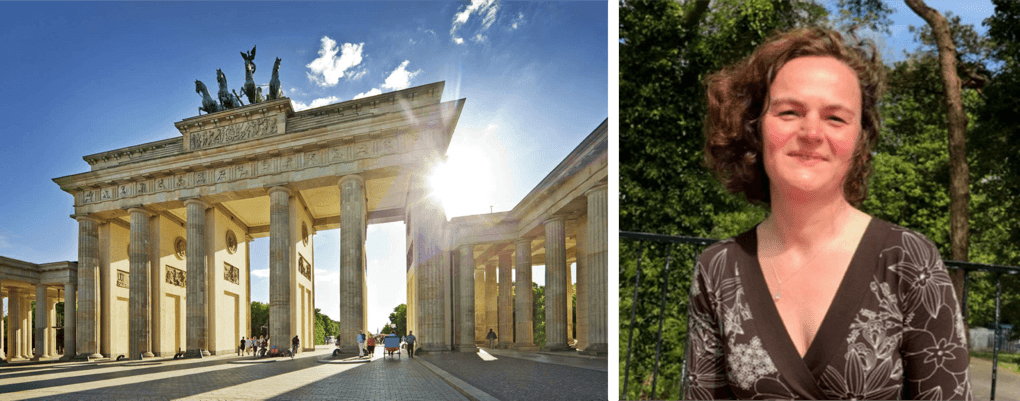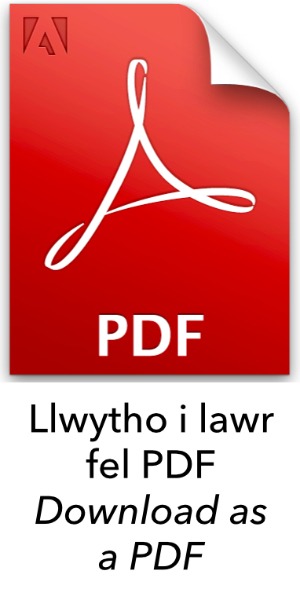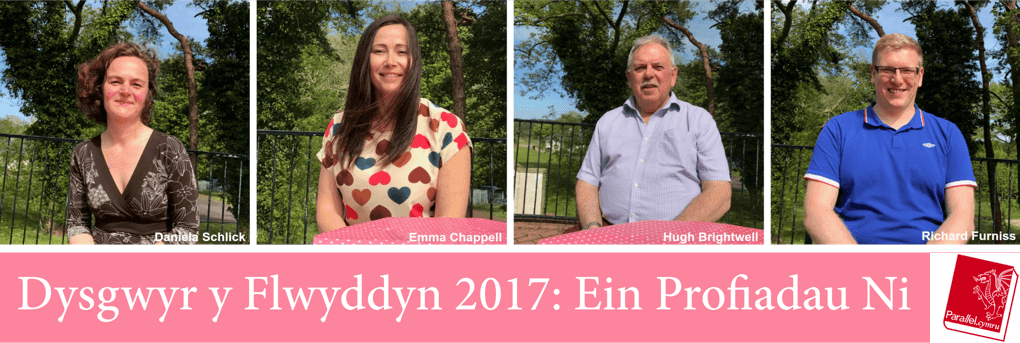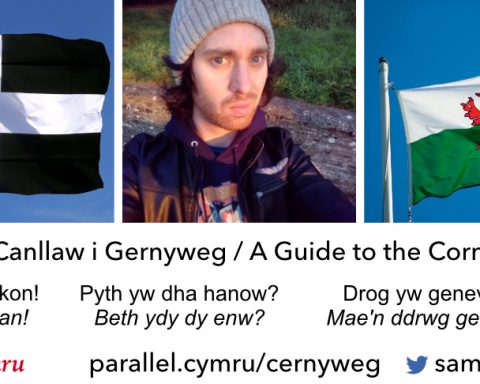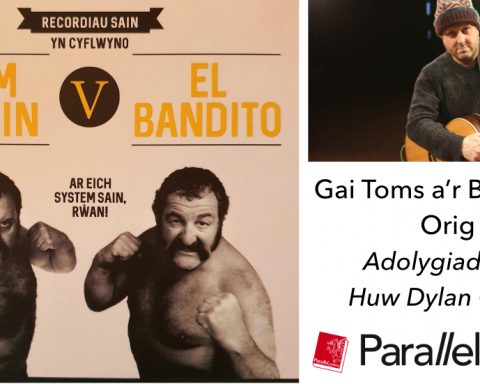Dyma’r dechrau o gyfres gyffrous newydd- cymharu Cymraeg i ieithoedd eraill- ond mewn fformat tairieithog! Mae Dani Schlick, sydd yn dod o Saxony a Berlin yn cyflwyno tebygrwydd a gwahaniaethau rhwng y Gymraeg ac Almaeneg…
Here is the start of an exciting new series- comparing Welsh to other languages- but in a trilingual format! Dani Schlick, who is from Saxony and Berlin, presents similarities and differences between Welsh and German…
Walisisch und Deutsch – Was haben die Sprache des Landes der Dichter und Sänger und die Sprache des Landes der Dichter und Denker gemeinsam?
| Ydy hi’n anodd dysgu Cymraeg? Mae llawer o bobl yn gofyn i mi. Wel, mae’n anodd dysgu unrhwy iaith. Mae’n her ac yn waith caled weithiau. Ond hefyd mae’n agor drysau i galonau’r bobl ac i ddiwylliant, mae’n ehangu’r gorwelion a mae’n agoriad llygaid weithiau. | Is it difficult to learn Welsh? That’s what many people ask me. Well, it’s difficult to learn any language. It’s a challenge and sometimes hard work. But it also opens doors to the people’s hearts and to the culture, it widens your horizons and sometimes it’s an eye opener. | Ist Walisisch eigentlich schwer zu lernen? Fragen mich viele Leute. Es ist immer schwierig, eine Sprache zu lernen. Es ist eine Herausforderung und manchmal auch harte Arbeit. Aber es öffnet auch Türen zu den Herzen der Menschen und zur Kultur, es erweitert den Horizont, und manchmal öffnet einem es auch die Augen. |
| I mi fel Almaenes mae yna lawer o bethau sydd yn fy helpu dysgu Cymraeg. Mae’r Gymraeg - fel yr Almaeneg - yn ffonetig, sef mae yna un ffordd o ynganu bob llythyren. Mae yna eithriadau, wrth gwrs, ond mae hyd yn oed yr eithriadau yn dilyn trefn. Mae yna system yn y ddwy iaith. A diolch byth am hynny! | For me as a German, there are many things that help me learn Welsh. It is – like German – phonetic, there is one way of pronouncing each letter. There are exceptions, of course, but even the exceptions follow a rule. There is a system in both languages. Thank God for that! | Für mich als Deutsche gibt es viele Dinge, die mir helfen, Walisisch zu lernen. Walisisch ist – wie Deutsch auch – phonetisch. Für jeden Buchstaben gibt es eine Aussprache, mit Ausnahmen, natürlich, aber sogar die folgen einer Regel. Beide Sprachen haben System. Zum Glück! |
| Ia, rydan ni’n Almaenwyr yn hoff iawn o gael system a threfn ar bethau. A mae’n rhaid i mi gyfaddef un peth: Mae’r Gymraeg yn fwy systematig fyth na’r Almaeneg! | Yes, we Germans like to have a system and order with things. And I have to admit one thing: Welsh is even more systematic than German! | Ja, wir Deutschen haben gern System und Ordnung in allem. Dabei ich muss eines zugeben: Walisisch ist sogar noch systematischer als Deutsch! |
| Er nad oes treigladau yn yr Almaeneg, rydan ninnau’n ffeindio ffyrdd o wneud i’r iaith lifo pan ydan ni’n siarad. Rydan ninnau’n cwtogi geiriau ac yn rhoi geiriau ynghyd, e.e. mae’r geiriau am “wyt ti wedi...?” “hast du ...?” yn troi i “haste...?” – fel “ti ‘di...?”. | Although there are no mutations in German, we, too, find ways of making the language flow when we are speaking. We, too, shorten words and join them together, e.g. the words for “have you..?” “hast du...?” become “haste...?”. | Obwohl es im Deutschen keine Lenierungen gibt, finden auch wir Wege, die Sprache fließen zu lassen. Auch wir verkürzen Wörter und fügen sie zusammen, so wird z.Bsp. aus “hast du..?” (walsisch: “wyt ti wedi..?”) “haste...?” (walisisch: ‘ti ‘di...?”). |
| Tafodieithoedd Mae hynny yn amrywio rhwng y tafodieithoedd hefyd. A sôn am dafodieithoedd. Mae yna lwyth ohonyn nhw yn yr Almaen. Casgliad o deyrnasau a thywysogaethau bychan ydy’r wlad yn y pendraw. Diolch i Martin Luther mae yna iaith Almaeneg mae pawb yn siarad heddiw, er efo acenau gwahanol. A mae llawer o’r tafodieithau yn dal yn fyw. Martin Luther oedd y cyntaf i wynebu’r amrywiaeth o ieithoedd yn y gwledydd Almaenig pan gyfiethodd o’r beibl o’r Lladin i’r Almaeneg – i Almaeneg doedd ddim yn bodoli cyn hynny. | Dialects This even varies between the dialects. Speaking about dialects, there are loads of them in Germany. The country is an accumulation of small kingdoms and principalities in the end. Thanks to Martin Luther there is a German language today that everybody can speak, although with different accents. And many dialects are still very much alive. Martin Luther was the first to face the variety of languages in the German countries when he translated the bible from Latin into German – into a German that had not existed before then. | Dialekte Das variert dann auch noch zwischen den Dialekten. Apropos Dialekte. Die gibt es in Deutschland zu hauf. Letztendlich ist das Land eine Ansammlung von kleinen Königreichen und Fürstentümern. Martin Luther ist zu verdanken, dass es heute eine deutsche Sprache gibt, die alle sprechen, wenn auch mit unterschiedlichen Akzenten. Und viele der Dialekte sind noch immer lebendig. Martin Luther stellte sich als erster der Vielzahl der Sprachen in den deutschen Ländern, als er die Bibel aus dem Lateinischen ins Deutsche übersetzte – ein Deutsch, dass es vorher nicht gab. |
| Yn yr Almaen, mae’r tafodieithoedd yn newid efo’r tirwedd. Yn y gogledd ar lan y môr lle mae’r tir yn fflat iawn, mae’r iaith yn eithaf meddal. Pellaf ewch chi i’r de ac uchaf mae’r mynyddoedd, caletaf eith yr iaith. | In Germany the dialects change with the landscape. In the north by the sea where the country is flat, the language is rather soft. The further south you go and the higher the mountains are, the harder the language becomes. | In Deutschland varieren die Dialekte mit der Landschaft. Am Meer im Norden, wo das Land flach ist, ist die Sprache eher weich. Je weiter man nach Süden kommt und je höher die Berge werden, desto härter wird die Sprache. |
| Mae dysgu iaith hefyd y golygu dysgu defodau a dysgu am enaid y bobl sydd yn siarad yr iaith. Yn yr Almaen rydan ni’n dweud pethau yn reit uniongyrchol. Rydan ni’n ymarferol ac yn effeithlon iawn. Wel, i fod. Yng Nghymru ac yn y Gymraeg, y teimlad a’r bobl a’r gymuned sydd yn bwysig, a’r pethau sydd ddim yn cael eu dweud. | Learning a language also means learning about traditions and about the soul of the people who speak the language. In Germany we say things rather directly. We are pragmatic and efficient. Well, supposedly. In Wales and in Welsh it’s the feeling, the people and the community that are important, and the things that are not said. | Eine Sprache zu lernen, heißt auch, Sitten und Bräuche und die Seele der Menschen zu begreifen, die die Sprache sprechen. In Deutschland sagen wir die Dinge recht direkt. Wir sind pragmatisch und effizient. Naja, irgendwie. In Wales und in der walisischen Sprache sind es Gefühle, die Menschen und die Gemeinsachaft, die wichtig sind, und die Dinge, die nicht gesagt werden. |
| Yr her mwyaf i mi, gan symud rhwng yr ieithoedd, ydy cael teimlad, cael enaid yr iaith. Yn anffodus, dydy hyn ddim yn dŵad dros nos. Mae’n cymryd amser ac yn amlach na pheidio mae’n golygu dweud a gwneud pethau od. Wel, rydw i’n dweud pethau od yn aml iawn – dim ond fel rhan o fy addysg Gymraeg, wrth gwrs! | Moving between languages - the greatest challenge for me is getting the feeling, the soul of the language. Unfortunately, this does not come overnight. It takes time and – more often than not – it involves saying and doing odd things. Well, I quite often say odd things – only as part of my Welsh education, of course! | Im hin und her zwischen den Sprachen ist für mich die größte Herausforderung, das Gefühl, die Seele der Sprache zu erfassen. Leider kommt das nicht über Nacht. Das braucht Zeit und ziemlich oft heißt das auch, komische Dinge zu tun und zu sagen. Nun ja, ich sage sehr oft komische Dinge – natürlich nur im Rahmen meiner walisischen Ausbildung! |
| Hyd yn hyn rydw i’n falch iawn o gael y teimlad iawn ran fwyaf o’r amser – fwy neu lai. A rydw i’n edrych ymlaen at gael mwy fyth! | So far I am very happy that I am getting the right feeling most of the time – more or less. And I am looking forward to getting more! | Ich bin sehr stoltz darauf, inzwischen zumindest meistens das richtige Gefühl zu haben. Und ich freue mich auf mehr! |
| Beth am y farddoniaeth a’r gerddoriaeth? Gwlad Beirdd a Chantorion ydy Cymru, wedi’r cwbl. Er na fedra i gynganeddu, rydw i wrth y modd â’r llif mae o’n rhoi i’r iaith. I mi mae’r Gymraeg yn llifo fel tonnau’r môr. A mae hyn yn adlewyrchu yn y gerddoriaeth hefyd. | What about poetry and music? Wales is the land of poets and singers. Although I can’t do cynghanedd, I love the flow that it gives to the language. To me Welsh flows like waves in the sea, which reflects in the music as well. | Wie steht es um die Poesie und Musik? Schließlich ist Wales das Land der Dichter und Sänger. Obwohl ich die Kunst des cynganeddu nicht beherrsche, liebe ich den Fluss, den es in die Sprache bringt. Für mich fließt die walisische Sprache wie Wellen im Meer. Und das zeigt sich auch in der Musik. |
| Yn yr Almaeneg mae yno gerddi sydd yn cynnwys elfenau’r cynghanedd ac yn defnyddio offer gwahanol er mwyn chwarae efo’r iaith i gefnogi syniad y gerdd. Enghraifft dda ydy’r gerdd “Der Panther” gan Rainer Maria Rilke sydd yn cynnwys defnydd arbennig cytseiniau ac odl mewnol yn debyg iawn i’r gynghanedd. Ac wrth gwrs, mae gynnon ni gerddorion fel Beethoven, Bach, Mozart a Wagner. | In German there are poems that have elements of cynghanedd and use different means in order to play with the language and to support the idea behind the poem. A good example is the poem “Der Panter” by Rainer Maria Rilke and its special use of consonants and internal rhyme which is very similar to cynghanedd. And we have got composers like Beethoven, Bach, Mozart and Wagner. | Deutschland ist das Land der Dichter und Denker. Und es gibt dort Gedichte, die Elemente des cynganeddu enthalten und Metren verwenden, um mit der Sprache zu spielen und die Intention des Gedichtes zu unterstützen. Ein gutes Beispiel dafür ist das Gedicht “Der Panther von Rainer Maria Rilke, das auf besondere Weise Konsonanten und innere Reime verwendet, die dem cynghanedd sehr ähnlich sind. Und wir haben Komponisten wie Beethoven, Bach, Mozart und Wagner. |
| Wrth ysgrifennu’r erthygl hon ac wrth ei chyfeithu i fy mamiaith Almaeneg, rydw i’n sylwi pa mor hir mae’r geiriau a’r brawddegau yn yr Almaeneg. O mam bach, mae’n wir! A hefyd rydw i’n sylwi ar batrymau a’r llif arbennig sydd yn y ieithoedd gwahanol, sydd yn gwneud pob iaith yn arbennig. A mae yna geiriau ac ymadroddion sydd ddim yn cyfieithu. | While I am writing this article and translating it into German, my mother language, I notice how long the words and sentences are. Oh dear, it’s true! Also I notice the special patterns and flow that are in different languages, that make every language special. And there are words and idioms that just do not translate. | Während ich diesen Artikel schreibe und in meine Muttersprache Deutsch übesetze, fällt mir auf, wie lang die deutschen Wörter und Sätze sind. Oh jeh, es ist also wahr! Außerdem fallen mir der besondere Fluß und die Muster auf, die es in verschiedenen Sprachen gibt, die jede Sprache besonders machen. Und es gibt Wörter und Redwendung, die man einfach nicht übersetzen kann. |
| “Cenedl heb iaith, cenedl heb galon”, meddan nwh. Mae yna galon fawr ym mhob iaith ac yn y bobl sydd yn ei siarad. | “A nation without a language is a nation without a heart” they say. There is a lot of heart in every language and in the people who speak it. | “Ein Volk ohne Sprache ist ein Volk ohne Herz” heißt es. Es ist eine Menge Herz in jeder Sprache und in den Menschen, die sie sprechen. |
Mae dysgu iaith hefyd y golygu dysgu defodau a dysgu am enaid y bobl sydd yn siarad yr iaith.
Der Panther – Rainer Maria Rilke
Sein Blick ist vom Vorübergehen der Stäbe
So müd’ geworden, dass er nichts mehr hält,
Ihm ist, als ob es tausend Stäbe gäbe,
Unter hinter tausend Stäben keine Welt.
Der weiche Gang geschmeidig starker Schritte,
Der sich sich im allerkleinsten Kreise dreht,
Ist wie ein Tanz von Kraft um eine Mitte,
In der betäubt ein starker Wille steht.
Nur manchmal schiebt der Vorhang der Pupille
Sich lautlos auf. – Dann geht ein Bild hinein,
Geht durch der Glieder angespannte Stille –
Und hört im Herzen auf zu sein.

